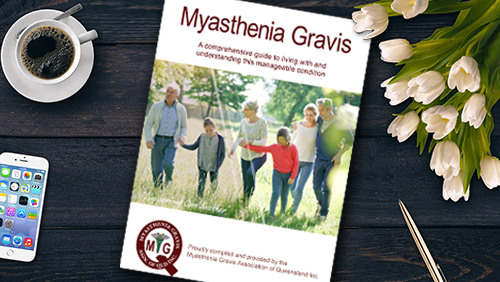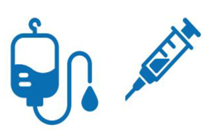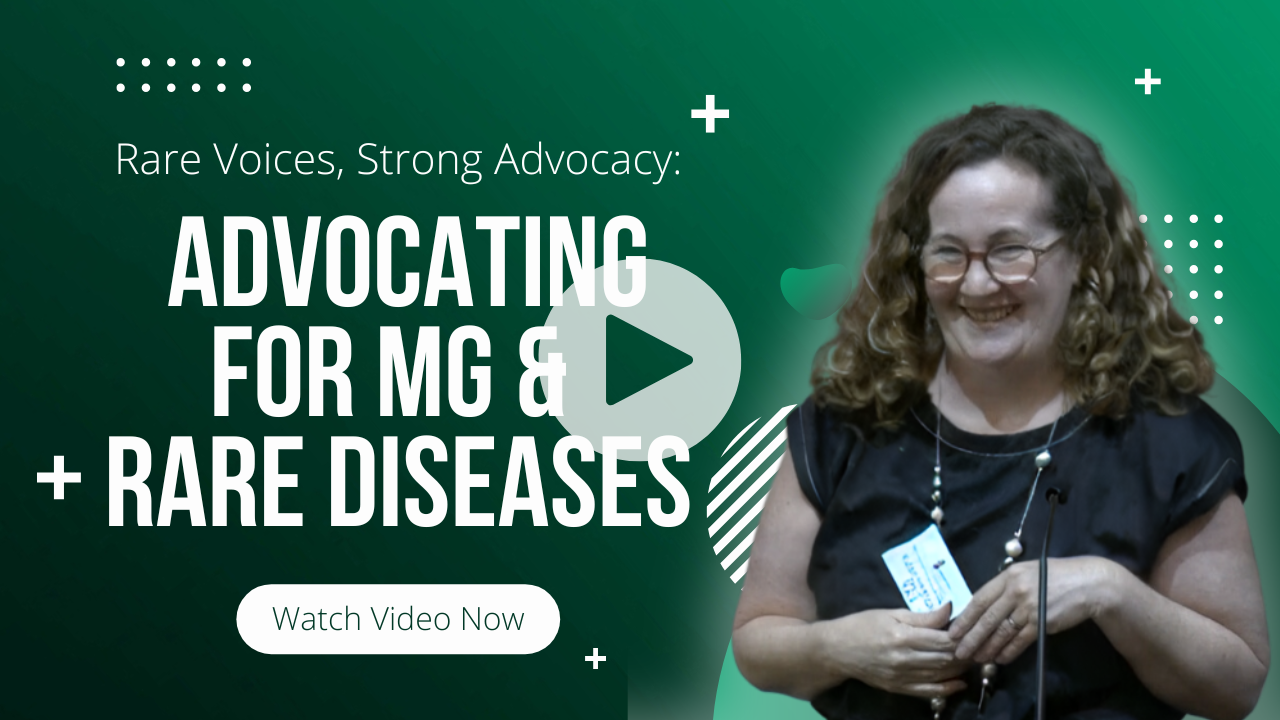- Home
- Resources
Resources

HEALTHED INTERVIEW – Dr Fiona Chan, Neurologist
Healthed, an independent medical education provider, in association with MGNSW, produced this interview with Dr Chan. Discussion topics included increased diagnosis of MG, symptoms, how to test for MG and referral and treatment goals.

Drugs & MG
The Association has collaborated with Myasthenia Alliance Australia (MAA) to produce a list of medications that can worsen symptoms in patients suffering from myasthenia gravis (MG). This list is designed as an aid to assist in guiding therapeutic decisions for MG patients and their doctors.

Information Booklet
The Association has put together an Information Booklet that covers the following topics:
- The different treatment options available
- Information about the condition
- Medication
- Facts for the patient and their family

Intravenous Immunoglobulin (IVIG)
Intravenous immunoglobulin (IVIG) is a compound from blood donors that is used to treat autoimmune diseases such as Myasthenia gravis, through the addition of antibodies from the blood donors. A patient-centred brochure has been developed to explain the uses of IVIG therapy for new and existing patients.

Research Paper
Myasthenia gravis can lead to impairments in vision, dizziness, hearing and fatigue and these can affect balance confidence, community participation, and quality of life. This paper examines these impairments and how allied health is utilised in treating these impairments.

Research Paper
The Patient Reported Outcomes study, is now published in the Journal of Clinical Neurosciences – Clinical features, treatments, their impact, and Quality of Life for Myasthenia Gravis patients in Australia. This paper includes significant and indisputable, evidence-based findings help Government and Specialists, and others to understand the challenges of living with MG.

Speech Pathology for MG
Myasthenia gravis (MG) interrupts the communication pathway between muscles and nerves and this can affect the head and neck muscles that people use to speak and swallow. If you live with speech issues from MG, you might benefit from speech therapy. Here are five information sheets on how speech pathology can help people with MG.

Rare Diseases and Advocacy – Louise Healy
Louise Healy is the Education and Advocacy Manager at Rare Voices Australia (RVA), the national peak body for Australians living with a rare disease. Louise kindly presented at the 4th National Patient Focused Myasthenia Conference in Sydney in 2023. Louise provided valuable insights into advocating for rare diseases and the importance of having a voice.

Expanding Treatment Options - January 2025
Living with MG means navigating a complex treatment journey. While we’ve come a long way with effective therapies like steroids, immunosuppressants, IVIG, and surgery, not all patients respond the same way. New treatments aim to fill these gaps, providing more options and hope for people with this challenging condition.

OH MG with Chloe Wigg
Myasthenia Gravis Awareness Month went to a new level this year with the Oh MG Art Exhibition held at the Logan Art Gallery in Brisbane.
The artist, Chloe Wigg, who also has MG, worked for several years to stage this wonderful exhibition which highlights MG as a snowflake condition. The use of Mestinon bottles also sends a very clear message about the reliance of this medication by people with MG.
Please take the time to view snippets of this wonderful work.
Also, please follow Chloe’s work as an artist by visiting –
DVD'S
We welcome donations of relevant material from our members.
The Association has also produced DVD's of Guest Speaker presentations to its members. These presentations cover topics of interest to people who suffer from, or who care for sufferers of, Myasthenia Gravis.
The videos are available free of charge to Category 'A' (sufferer of MG) financial members of the Association, but cannot be displayed other than in private without the express permission of the Myasthenia Gravis Association of Queensland Inc. If you wish to obtain any of the future DVD's and are not a current financial member of the Association, you will need to complete the Application for Membership form and forward, with the required Membership Subscription Fee, to: (Refer address on the right)
New members wishing to view any of the listed DVD's can do so by contacting the Librarian as indicated below. They are available on loan from our library.
Please note: Membership is only available to residents of Australia.
Available DVD'S
Dr Rob Henderson - Neurologist. MG and Thymoma - Other information on Myasthenia Gravis.
Professor Cindy Gallois - Social Psychologist - Living with chronic Illness.
Presentation from Professor Pamela Mc Combe - Research into MG Past, Present and Future.
Katrina Williams (Specialist Neurological Physiotherapist) - 13 September 2009.
This title includes:
- Exercise and MG
Rebecca Elkington (Accredited Practicing Dietician) - 12 September 2010 Myasthenia Gravis: Information on Good Nutrition.
This title includes:
- Commonly experienced nutritional barriers and strategies to overcome these;
- High protein, high energy eating strategies;
- Getting a lot of nutrition out of little serves.
Associate Professor Stephen Reddel - The Many Myasthenias - September 2017
Dr Cecilie Lander M.B., B.S., F.R.A.C.P., F.R.C.P.E.
This title includes:
- Dr Lander talks about MG and gives an overview of autoimmune disease in the nervous system, with the perspective of being a neurologist for the last 35 years.
Dr Jean Foster M.B., B.S.
This title includes:
- Making the most out of your GP
Dr Stefan Blum MD, FRACP and Dr Jennifer Nitz PhD, Mphty, Bthpy, FACP.
This title includes:
- Dr Blum presents a preliminary report on findings from the Data Collection Survey on people with myasthenia gravis.
- Dr Nitz presents preliminary findings from the ‘Exercise Effect in MG’ Pilot Study.
Dr Stefan Blum and Dr David Lee.
This title includes:
- Some Interesting findings from the MGAQ Survey
Rare Voices Australia - What it is and How it can help with MG
By Executive Officer Nicole Millis
Lending Library
The committee has decided to establish a lending library of MG and related information resources. The collection is small to start off with but will be expanded over time.
Loans of material are available to financial members of the Association and the loan period is 1 calendar month. Postage out is paid by MGAQ and return postage is the responsibility of the member.
Initial offerings are:
- Myasthenia Gravis and Myasthenic Disorders (book)
- Living a Healthy Life with Chronic Conditions (book)
- Living Well with Autoimmune Disease (book)
- Rare Voices Australia - The Australian Experience of Living with a Rare Disease (book)
- Attacking Myasthenia Gravis - By Ronald E Henderson, MD (book)
- Beyond Blue – volumes 1 & 2 (DVD)
- Complete Collection of Association Guest Speaker Recordings (DVD)
To request a loan, please contact John on (07) 3293 4655 or email jam3740@bigpond.com
Effects of Balance Strategy Training in Myasthenia Gravis: A Case Study Series
ABSTRACT: Introduction: Studies of exercise in patients with myasthenia gravis (MG) are sparse. Balance strategy training (BST) multimodal exercise has proven efficacy in adults for enhancing balance and functional mobility. This prospective study aims to determine if BST improves functional ability and balance in people with MG. Methods: Seven individuals with MG participated in a 16-session workstation intervention. Repeated measures (pre/post-intervention and 4-week followup) consisting of quantitative myasthenia gravis score (QMG), 6-minute walk test (6MWT), timed up and go (TUG) with dual task (TUGmanual and TUGcognitive), and standing stability on foam with eyes closed (foamEC) were assessed. Results: Most measurements showed sustained improvement at follow-up. QMG, TUGcognitive, and foam EC achieved clinically significant improvements (>15%). No adverse effects were reported. Conclusions: BST was effective in improving balance and QMG scores in subjects with MG. A multimodal BST approach is thus suggested to target different aspects of balance and functional mobility.
The CIE Report
The Costs to Patients and the Community of Myasthenia Gravis. Understanding the patient experience and community wide impact.
